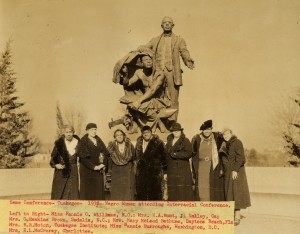Creator: Ames, Jessie Daniel, 1883-1972.
Collection number: 3686
View finding aid.
Abstract: Jessie Daniel Ames, civil rights worker of Atlanta, Ga., Georgetown, Tex., and Tryon, N.C. Beginning in 1922, Ames served separate roles as secretary and vice-president of the Texas Committee on Interracial Cooperation. By 1929, she had moved to Atlanta, where she was

director of Women’s Work for the Commission on Interracial Cooperation. During this time, Ames established the Association of Southern Women for the Prevention of Lynching, which functioned as a volunteer component within the Commission. Correspondence, speeches, reports, clippings, autobiographies, school materials, photographs, and other papers relating to the public service and private life of Jessie Daniel Ames. Organizational papers document Ames’s work as officer of the Texas Interracial Commission and the Commission on Interracial Cooperation in Atlanta and as founder of the Association of Southern Women for the Prevention of Lynching. Subjects include education, lynching, domestic servants, conferences, public opinion, and other dimensions of race relations. Correspondents include Howard Odum, Guy B. Johnson, Will W. Alexander, and George Washington Carver. Included is a 1930 color poster from the Soviet Union that uses lynching to denounce both Christianity and the United States. Family papers document Ames’s efforts as a single parent to raise and educate three children. Letters show that Frederick (1907-1959) became a pediatrician with a private practice in Houston, Tex., and served as a Navy physician during World War II; Mary became a pediatrician in Harrisburg, Pa., and a professor at the University of Pennsylvania in Philadelphia; and Lulu, crippled by polio as a child, became a successful editor.
Repository: Southern Historical Collection
Collection Highlights: Included are case histories of individual lynchings investigated by the ASWAL (mostly 1933); notes on the Federal Anti-Lynching Bill (1934-1937); and letters pertaining both to race relations (1944-1946) and to a training school for delinquent African-American girls (1929).
